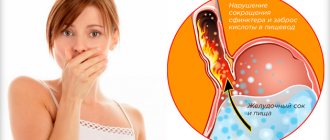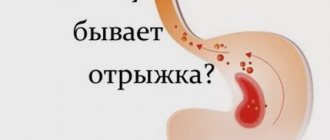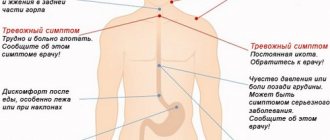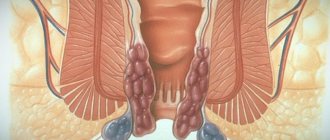What is nausea with belching
Nausea with belching can occur under different circumstances, and a painful feeling of impending vomiting is felt. Sometimes the provoking factor can be easily eliminated and the symptoms go away quickly. But in some cases, such a symptom is a consequence of serious gastrointestinal diseases. Nausea can be accompanied by any type of belching. Symptoms most often occur some time after eating or on an empty stomach.
Nausea and belching occur when the vagus nerve is involved
Causes and triggers of nausea and belching (air, rotten eggs, etc.)
| Symptoms | Causes |
| Belching air | Gastritis |
| Lump in the throat |
|
| Dizziness |
|
| Constant symptoms | Inflammatory diseases of the gastrointestinal tract:
|
| Burping rotten eggs |
|
| Diarrhea |
|
| Gas formation | Disturbances in the functioning of the large and small intestines. |
| Weakness, fever and chills |
|
| Severe nausea and belching |
|
| Worse after eating |
|
| Nausea and belching on an empty stomach |
|
Diagnostic tests
It is very important to identify the cause of such symptoms. For these purposes, a whole range of diagnostic studies is often used:
- FGDS is an endoscopic method that allows one to identify structural changes in the gastric mucosa. To do this, a thin tube, at the end of which an optical device is installed, is placed into the esophagus and from there advanced to the stomach. In this case, the inflamed mucous membrane and the presence of ulcerative lesions are clearly visualized. This method eliminates gastritis, ulcers and atrophic changes.
- Ultrasound - ultrasound helps determine inflammation of the pancreas, as well as pathologies of the liver and gall bladder, which is very important in the presence of nausea and belching.
- Colonoscopy is an endoscopic research method similar to FGDS. Only the probe is advanced through the rectum. Using this method, you can detect the presence of polyps and inflammatory diseases in the intestines.
Drug therapy
Nausea with belching can be corrected with medication. For this purpose, a whole range of different drugs is used. Main groups of medications:
- Motor stimulants. These include Trimedat. It prevents stagnation of the food bolus in the stomach and eliminates accompanying cramps. It is used for sluggish peristalsis and in the presence of chronic atrophic gastritis.
- Enzymes: Mezim, Pancreatin and others. Used to replenish the enzymes necessary for high-quality digestion of food. Used for inflammatory processes in the pancreas.
- Antacids and proton pump blockers. Enveloping antacid drugs: Maalox and Gastal are most often prescribed for frequent belching and gastritis, when heartburn is present. Proton pump blockers: Nolpaza, Emanera are used for ulcerative lesions, as well as for inflammatory processes in the gastric mucosa.
- Drugs that regulate bowel function. One of these remedies is Kolofort, which has a beneficial effect on the functioning of the gastrointestinal tract. In addition, it has a mild psychotropic effect, which is indicated for irritable bowel syndrome caused by psychosomatics.
- Choleretic agents. For long-term chronic cholecystitis, Hofitol, Heptral, etc. are used. The drugs promote the secretion of bile and prevent its stagnation.
- Antiemetic drugs. These include Cerucal and Motilium. They help cope with the feeling of nausea and also relieve belching. They block the brain receptors responsible for the urge to vomit.
Photo gallery of medical products
Trimedat relieves nausea Mezim promotes the digestion of food Maalox envelops the gastric mucosa Nolpaza blocks the release of hydrochloric acid Colofort regulates intestinal function Hofitol has a choleretic effect Cerucal relieves nausea
Algorithm of actions for eliminating unpleasant symptoms
In the case where the cause is known (if there are chronic diseases of the gastrointestinal tract), you should use the medications that the doctor previously recommended for such situations. If nausea appears for no reason, it is better not to risk it, but to immediately seek help from specialists. So, let's consider all the activities step by step.
First aid
Lay the patient horizontally and give some warm water. If the pain is severe, call an ambulance.
No medications should be given before the doctors arrive, as they can blur the main symptoms, which help to make a correct diagnosis.
For pain in the left hypochondrium, you can put cold on your stomach.
Drug therapy
It is selected on an individual basis when the patient has been examined and a diagnosis has been made. The most commonly used medications are:
Antispasmodics: No-shpa, Baralgin, Baralgetas, Drotaverine - relieve smooth muscle lubrication, easing the patient’s condition. Effective for peptic ulcers, pancreatitis and cholecystitis. Enzymes - used only for diseases of the pancreas, gall bladder and liver. Pancreatin is most often prescribed. Choleretic drugs. Hormonal therapy: Corticosteroids. Sedatives: Glycine, Valerian, Motherwort.
To normalize the digestion process, medications such as:
Creon; Digestral; Gastocepin; Famotidine; Analgin; Eufillin; Trasylol; Panzinorm; Pankurman.
Alternative medicine recipes
The functioning of the digestive tract can be normalized not only with the help of medications, but also with the help of medicinal herbs. The most effective and safe decoctions are as follows:
Chamomile and calendula - brew according to the instructions, take a tablespoon before each meal. Sandy cumin can be toxic in large quantities, so take half a teaspoon of the decoction three times a day. St. John's wort is good for the stomach, especially in the presence of ulcers. Yarrow, immortelle and peppermint are taken in equal proportions, brewed as tea, and drunk 2 tablespoons on an empty stomach after waking up. Celandine and dandelion root (fresh) are crushed into a pulp, then brewed with boiling water and allowed to brew for at least 3-4 hours. Strain and drink 2-3 dessert spoons after each meal.
Traditional medicine recipes are effective only when recommended by a specialist. For different diseases, recipes may differ, which is worth considering. For some categories of patients, herbal medicine is not considered at all.
Diet food
If nausea and belching are present, then dietary nutrition is an integral part of treatment. To do this, you should exclude products that can stagnate in the gastrointestinal tract and lead to fermentation processes. It is necessary to remove from the diet:
- chips and snacks;
- fast food;
- fatty foods;
- meat dishes;
- soda;
- alcohol;
- spicy seasonings.
Meals should be small, at least 4 times a day. Fasting, which negatively affects the gastrointestinal tract, should not be allowed. Recommended to use:
- fish;
- steamed vegetables;
- sweet fruits;
- products made from wholemeal flour;
- porridge;
- jelly;
- mashed potatoes;
- steamed fish and poultry cutlets;
- pasta.
Photo gallery of dietary dishes and products
Steamed fish is very useful for the gastrointestinal tract Vegetable stew is well digestible Sweet fruits do not cause hypersecretion Wholemeal bread stimulates peristalsis Porridge improves intestinal function Mashed potatoes do not cause fermentation Steam cutlets do not stagnate in the intestines Pasta is a source of carbohydrates Kissel envelops the gastrointestinal tract
Folk remedies
Traditional methods of treatment can also be used to eliminate nausea and belching. The most effective recipes:
- Healing tea. You will need mint, St. John's wort and black currant leaves. All 3 components must be taken in equal quantities. 1 tbsp. l. The mixture should be poured with 400 ml of boiling water and closed tightly with a lid. After 40 minutes, it is recommended to filter the liquid and take 0.5 cups 3 times a day, 30 minutes before meals. The course of treatment is 10 days.
- Milk+honey. An additional ingredient is cinnamon on the tip of the knife. It is necessary to slightly warm 300 ml of milk, to no more than 40 degrees. Then add 1 tsp to it. honey and cinnamon. Mix everything thoroughly and consume before bed every day for a week.
- Decoction. You will need rose hips, St. John's wort, oregano, mint and raspberry leaves. All ingredients must be taken in equal proportions, 1 tsp each. and pour 700 ml of boiling water. Put on fire and cook for no more than 5 - 7 minutes. Then cool the liquid, filter and take 150 ml 3 times a day a quarter of an hour before meals for two weeks.
Photo gallery of folk remedies
Mint relieves nausea St. John's wort regulates the gastrointestinal tract Black currant leaves relieve belching Oregano has a beneficial effect on the entire body Rose hips help with diseases of the gastrointestinal tract Milk neutralizes aggressive acids in the stomach Honey relieves inflammation Cinnamon has a stimulating effect Raspberry leaves replenish the deficiency of nutrients
Why it occurs and what to do with belching and dizziness
The process of gas leaving the stomach or esophagus, called belching, can manifest itself as a symptom of various diseases, or as a natural physiological phenomenon in a healthy person. However, dizziness accompanying belching indicates the presence of pathology and in most cases requires immediate contact with a medical facility. Indeed, even for those situations where belching along with attacks of dizziness is caused, for example, by nervous overstrain, it is recommended that this be confirmed by a doctor.
Dizziness accompanying belching may be a sign of the following diseases and conditions of the body:
- Intoxication due to food poisoning or gastritis. In this case, general weakness, vomiting, diarrhea and fever may be added to the symptoms.
- Patient poisoning with alcohol. The main cause of symptoms is dehydration, so the problem is often solved by drinking plenty of fluids.
- Nervous strain, serious stress and depression caused by them (or caused by another reason). In this case, the patient may experience a drop in blood pressure, darkening of the eyes and general weakness.
- Asthenovegetative syndrome , additionally accompanied by migraine, nausea and excessive sweating.
- Reflex pain caused by diseases of the gastrointestinal tract.
- Osteochondrosis , in the presence of which the patient may also experience a “stormy” gait, pain in the neck and restrictions in head movements.
- Taking certain medications , which may be accompanied not only by belching and symptoms of dizziness, but also by nausea.
- Liver pathology.
The reasons for the appearance of 2 symptoms simultaneously include a brain tumor, pancreatitis, and iron deficiency in the body due to impaired hemoglobin production. Another reason is cholecystitis, which often occurs in people who suffer from cholelithiasis and excess weight. Belching and dizziness are also accompanied by the early stages of pregnancy - the cause of dizziness in this case is a low level of hemoglobin and lack of blood supply, and belching is caused by hormonal changes.
Regardless of the reasons for the belching that accompanies dizziness, patients should know that one-time symptoms are not always a cause for concern. You should respond to symptoms if they appear periodically or do not go away at all. Constant dizziness and the release of gas most likely indicate the progression of some disease.
The same symptoms should cause an immediate reaction in diabetics and hypertensive patients. You should not hesitate to see a doctor (or even call an ambulance) in cases where dizziness does not go away within an hour, and weakness appears in the limbs. If a person is no longer able to respond to his state of health, the appearance of high fever or vomiting along with belching and dizziness should cause concern for the patient or his relatives.
When a patient comes to the doctor with belching and dizziness, the specialist begins the examination by collecting an anamnesis. First of all, the time of onset of symptoms, their nature and additional symptoms are clarified. The doctor also requires information about the presence of bad habits, taking medications, the presence of chronic and acute diseases (including gastrointestinal diseases), injuries and visual or hearing impairments.
During the diagnostic process, the patient is prescribed electroencephalography, fluoroscopic examination of the cervical spine, ultrasound of the gastrointestinal tract and MRI of the brain. In some cases, the same list includes pure-tone audiometry and ECG. After receiving test results and determining the disease, appropriate treatment is prescribed.
Medicines prescribed by your doctor will help you get rid of the symptoms and causes of the problem. It is advisable to adhere to a special diet, which will increase the effectiveness of the medications and speed up recovery. Treatment can also be supplemented with traditional medicine - however, it is recommended to use them only after consulting with a specialist.
The list of medications that help with the onset of symptoms includes:
- H1-histamine receptor blockers that help cope with dizziness, nausea and belching - for example, Aviamarin and Dramamine;
- anti-vomiting agents such as Motilium and Cerucal;
- drugs for vasodilation - Verapamil and Amlodipine;
- medications to lower blood pressure - Albarel and Physiotens.
To counteract stress and relieve irritability, drugs such as Afobazole and Novopassit are prescribed. To improve blood circulation in the brain, you may need Cinnarizine or Nifedipine. By having a vasodilating effect, they effectively cope with dizziness.
The diet of a patient with belching and dizziness syndrome should consist of easy-to-digest foods:
- fresh or stewed vegetables;
- berries and fruits;
- croup;
- steam fish;
- dried fruits
Fried, spicy and fatty foods, alcohol and coffee are excluded from the menu. In addition, it is recommended not to overeat and immediately after eating, drink permitted drinks (freshly squeezed juices, tea). It is not recommended to chew chewing gum, drink carbonated water or talk while eating.
The following recipes can be used as additional means to relieve dizziness and belching:
- Decoction based on lemon balm and mint. Both ingredients, taken in equal proportions, are poured with boiling water (500 ml per 1 tablespoon of dry mixture) and cooked for 10 minutes. The filtered decoction is taken three times a day, an hour after meals.
- Hawthorn tincture. Take 200 g of the fruits of the plant, pour in 1 liter of cognac and infuse for 24 hours. The medicine is taken with honey twice a day, half an hour before meals.
- A cocktail obtained by mixing equal amounts of carrot and beet juice and half the volume of pomegranate juice. Take 1/2 cup 40 minutes before meals three times a day.
You can make a medicine based on parsley seeds, add 1 tbsp. l. raw materials, letting it brew for at least 8 hours and taking 50 ml four times a day. Medicine is also made from plantain, the dried leaves of which are poured with boiling water (1 tbsp per glass). It is recommended to take this drug half an hour before bedtime in the amount of 1 tbsp. l.
You can avoid the appearance of dizziness and the accompanying belching by adhering to certain rules:
- giving up bad habits;
- doing physical exercise;
- often walking in the fresh air.
In addition, the patient is advised not to overeat and it is advisable to continue to adhere to the diet. Although, when your health improves, you can reintroduce some foods. However, there should still be no carbonated drinks or strong coffee there. And physical exercises should be agreed with a doctor.
When the digestive system works well, a person is unfamiliar with such unpleasant symptoms as belching and nausea. If sometimes one of these signs occurs after eating, then this is not a reason to sound the alarm. But if you suffer from constant belching, and it is accompanied by nausea, then this indicates disturbances in the functioning of the digestive system. This is a good reason to take care of yourself and your health, and find out the cause of your symptoms. And there are quite a lot of them, which should be discussed in more detail.
Belching and nausea appear due to poor nutrition, that is, eating foods that the body cannot tolerate. For example, older people find it increasingly difficult to digest milk and dairy products: cottage cheese, kefir, fermented milk products, because the body does not produce as many enzymes for their processing as in younger years. There are other foods that can cause belching and nausea in a person:
- Strong coffee drunk on an empty stomach can provoke an attack of not only nausea, but also vomiting.
- Alcoholic drinks , especially strong ones and drunk in large quantities, cause intoxication, which causes belching and even vomiting.
- Inflammation of the stomach lining with high acidity prohibits the consumption of acidic foods and homemade vegetables.
- Mushrooms are heavy protein and difficult to process. Their use may provoke the symptoms in question.
The mechanism for the appearance of unpleasant symptoms is associated with a lack of synthesis of the necessary enzymes or individual intolerance to any product. Gradually, as a person grows older, the list of heavy foods expands, so he warns about the need to take care of his health. Heavy food load and constant infections undermine the condition of the body and do not go away on their own.
Nausea and belching of air in healthy people have other causes associated with improper food intake:
- When air is swallowed while eating, a belch is formed.
- After eating a large amount of food. In this case, both belching and nausea occur.
- Eating foods that produce gas in the stomach.
- If you do physical work immediately after eating.
- After eating fried or fatty foods, you usually feel nauseous.
- If you eat stale food, you start to feel sick.
- Pregnant women may experience belching after eating as a result of pressure on the diaphragm and nausea due to toxicosis.
Preventing nausea with belching is quite simple; you need to watch what you eat at every meal, unless you have a disease that causes this unpleasant symptom.
Treatment prognosis and complications
The prognosis for treatment in the presence of nausea and belching is in most cases good. With early diagnosis of the cause, symptoms can be quickly and effectively eliminated. Complications can occur only in the presence of serious provoking factors, such as atrophic gastritis, cirrhosis of the liver and stomach cancer. In this case, a long and complex approach to treatment is required. If you do not pay attention to the symptoms, other manifestations may occur.
When the pathology is accompanied by fever, diarrhea and vomiting, it is necessary to consult a doctor as soon as possible, because this may be a sign of intoxication.
Symptoms
You need to understand what signs signal the onset of the disease. The presence of pathology is judged by the results of complex diagnostics. You should be wary if, in addition to the bitter taste, the following symptoms appear:
- general weakness of the body;
- yellow coating on the tongue;
- periodic nausea;
- pain in the right hypochondrium;
- periodic discomfort in the stomach;
- increased body temperature (in rare cases).
Prevention measures
As preventive measures it is necessary:
- watch your diet;
- eat regularly, without taking long breaks;
- do not abuse alcohol;
- consult a doctor in a timely manner if unpleasant symptoms appear;
- do not lie down immediately after eating.
Causes of nausea and belching - video
The appearance of nausea and belching should not lead to panic, but a frequently recurring symptom should be alarming. Poor nutrition is often a consequence of such manifestations. To find out the cause, you need to consult a doctor. Preventive measures will prevent relapse.
Recommendations
Each of the above symptoms requires attention first from the patient and then from the doctor. And it is especially important to pay attention to them when repeating them systematically. Vomiting after eating or nausea after eating are symptoms that potentially characterize tumor diseases of the pharynx, esophagus or stomach. And although they are not the main ones, it is unacceptable to constantly put up with vomiting and get used to it without knowing its origin. An endoscopic examination of the stomach with a biopsy of the mucous membrane will allow you to find out the cause of these symptoms. Its diagnostic usefulness is extremely great, therefore FEGDS should be performed as early as possible.











